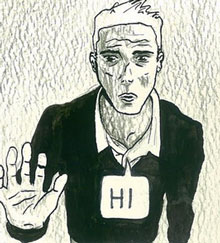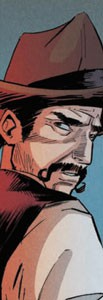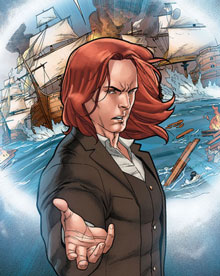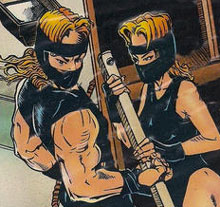 As long as there has been erotic reading material, there have been people trying to make it harder to find. We might have expected that the brave new world of the Internet was going to make everything accessible to everyone whenever they wanted it, but as it becomes more controlled by certain big corporations, the situation has become more complicated. Our friends John Roberson and Dale Lazarov have both found that they seem to have more trouble with digital versions of their erotic (or even just semi-erotic) work getting pulled from digital comics stores than they’ve had with the print versions of their work!
As long as there has been erotic reading material, there have been people trying to make it harder to find. We might have expected that the brave new world of the Internet was going to make everything accessible to everyone whenever they wanted it, but as it becomes more controlled by certain big corporations, the situation has become more complicated. Our friends John Roberson and Dale Lazarov have both found that they seem to have more trouble with digital versions of their erotic (or even just semi-erotic) work getting pulled from digital comics stores than they’ve had with the print versions of their work!
So this week we hear from both of them about the issues they’ve faced, and then for the big picture, we’ll consult British author Tim Pilcher, whose two-volume history of erotic comics includes the work of both John and Dale! Tim discusses the ongoing problems for erotic comics in digital distribution, including seemingly capricious and inconsistent removals of some erotic works; the limitations to what the Comic Book Legal Defense Fund can do; and what both creators AND fans of these works can do to keep them available!
See below for Tim Pilcher’s BBC appearance discussing the child pornography law in Japan.
Podcast: Play in new window | Download
Subscribe: | More
Continue reading #470 Erotic comics, erratic censorship


 This year’s International Comics Festival (Kaigai Manga Festa) in Tokyo was bigger than ever! Plenty of familiar faces from past years gave it a sense of community (long sought by many foreign comics creators feeling rather isolated in Japan), but there were plenty of new faces, too, many of whom flew in from Europe and North America to be here. Tim once again procured a media pass and went booth-to-booth gathering interviews! Photos and Web links for all interviewees are below.
This year’s International Comics Festival (Kaigai Manga Festa) in Tokyo was bigger than ever! Plenty of familiar faces from past years gave it a sense of community (long sought by many foreign comics creators feeling rather isolated in Japan), but there were plenty of new faces, too, many of whom flew in from Europe and North America to be here. Tim once again procured a media pass and went booth-to-booth gathering interviews! Photos and Web links for all interviewees are below. You may have heard
You may have heard  Brian Schirmer, a comics educator in San Francisco and writer of
Brian Schirmer, a comics educator in San Francisco and writer of  As long as there has been erotic reading material, there have been people trying to make it harder to find. We might have expected that the brave new world of the Internet was going to make everything accessible to everyone whenever they wanted it, but as it becomes more controlled by certain big corporations, the situation has become more complicated. Our friends
As long as there has been erotic reading material, there have been people trying to make it harder to find. We might have expected that the brave new world of the Internet was going to make everything accessible to everyone whenever they wanted it, but as it becomes more controlled by certain big corporations, the situation has become more complicated. Our friends  Time travel is a fascinating topic to many, and Fred Van Lente‘s current Ivar, Timewalker series from Valiant is timesurfing at both its most fun, and most scientific, with nods to Stephen Hawking’s writings on the subject. Van Lente did his own time jump to the past a couple years ago in The Comic Book History of Comics. This week Tim discusses both these works with him, along with Spider-Man, Archer & Armstrong, reassessing Fredric Wertham, and more.
Time travel is a fascinating topic to many, and Fred Van Lente‘s current Ivar, Timewalker series from Valiant is timesurfing at both its most fun, and most scientific, with nods to Stephen Hawking’s writings on the subject. Van Lente did his own time jump to the past a couple years ago in The Comic Book History of Comics. This week Tim discusses both these works with him, along with Spider-Man, Archer & Armstrong, reassessing Fredric Wertham, and more.
 Remember the ‘90s? Remember gold foil covers and mutants with huge guns and toothpick feet? If so, then perhaps you also remember Malibu Comics, the company that originally served as Image Comics’ publisher. After Image broke off on its own, Marvel bought Malibu, only to shut it down when the comics industry imploded. Roland Mann was an editor at Malibu (on the Ultraverse titles, among others) and has also written a number of comics (including Cat and Mouse). This week Tim talks with Roland about the ‘90s and what he’s been doing since then, including a new comic,
Remember the ‘90s? Remember gold foil covers and mutants with huge guns and toothpick feet? If so, then perhaps you also remember Malibu Comics, the company that originally served as Image Comics’ publisher. After Image broke off on its own, Marvel bought Malibu, only to shut it down when the comics industry imploded. Roland Mann was an editor at Malibu (on the Ultraverse titles, among others) and has also written a number of comics (including Cat and Mouse). This week Tim talks with Roland about the ‘90s and what he’s been doing since then, including a new comic,  Artist Stephen Bissette is best-known for his work on Swamp Thing in the ’80s with Alan Moore and John Totleben, as well as 1963 and his solo project Tyrant. Currently he’s teaching at the Center for Cartoon Studies, and this week he joins Tim and Kumar for a wide-ranging discussion, including:
Artist Stephen Bissette is best-known for his work on Swamp Thing in the ’80s with Alan Moore and John Totleben, as well as 1963 and his solo project Tyrant. Currently he’s teaching at the Center for Cartoon Studies, and this week he joins Tim and Kumar for a wide-ranging discussion, including: